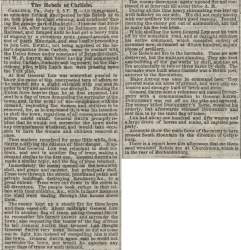Record Data
Transcription
The Rebels at Carlisle.
CARLISLE, Pa., July 2, 5 P. M. – An engagement, as unlooked for and unexpected to the Rebels as to us, took place here last evening, and continued during the greater part of the night. It seems that FITZHUGH LEE, after having cut the Baltimore and Ohio Railroad, and foraged until he had got a heavy train of wagons by a circuitous route passed around one end of South Mountain, and was hastily proceeding to join Gen. EWELL, not being apprised of the later’s departure from Carlisle, came in contact with the Union forces under command of Brigadier-General W. F. SMITH, said force having just commenced to enter Carlisle, footsore and legweary, on the Harrisburg pike, while LEE’S men were pressing upon the York pike.
At first General LEE was somewhat puzzled to know the cause of this unexpected turn of affairs, so he entered into a slight skirmish with our men in order to try and ascertain our strength. Finding the Union force heavier than he at first expected, LEE sent in a flag of truce demanding the surrender of the town, and, in the event of non-compliance with the demand, requesting the women and children to be removed, for, as he expressed it, it was his intention to shell the town, regardless of all consequences such action might entail. General SMITH promptly replied that he would not surrender the town under any circumstances whatever, and would take occasion to have the women and children removed at once.
Thus matters remained for some little while, Gen. SMITH notifying the citizens of their danger. It appears that General LEE was reluctant to shell the town, and sent in another flag of truce, making a demand similar to the first one. General SMITH also made a similar reply, and the flag of truce returned.
Immediately the enemy opened on the town with shell, and grape and canister, but principally shell. These tore through the streets, penetrated public and private buildings, destroying furniture, &., to a great extent. Trees were cut down in the streets in all directions. The people took refuge in their cellars with their children, &c., while in many instances the shell were tearing through the houses above them.
The enemy kept up a steady fire for three hours and then eased off. About midnight General LEE sent in another flag of truce, asking General SMITH to reconsider his former answer and surrender the town; also requesting the bearer of the flag of truce to tell General SMITH that General LEE thought General SMITH very mean because he did not come out to fight him instead of compelling him to shell the town. General SMITH again said he would not surrender the town, nor would he entertain any more flags of truce for such demand.
The enemy thereupon again opened fire and continued it at intervals till about three A. M.
During all this time heavy skirmishing was kept up with infantry on our side. We did not reply heavily with our artillery for certain good reasons. Toward morning the enemy go out of ammunition, and had to make his fire less brisk.
While shelling the town General LEE sent his train off by the mountain road, and at daylight withdrew his entire command, which consisted entirely of mounted men, estimated at fifteen hundred, and six pieces of artillery.
The Rebels set fire to the barracks. These are now destroyed, but the walls are standing. They also fired one building of the gas works by shell, and also set fire accidentally to two or three barns by shells. The barracks were built when Carlisle was a British post, anterior to the Revolution.
Major ANDRE was once in command here. They covered some six acres of ground, and were quite extensive and strongly built of brick and stone.
General SMITH sent a volunteer aid named DOUGHERTY with a communication to General KNIPE. DOUGHERTY was cut off on the pike and captured. The enemy killed DOUGHERTY’S horse, wounded his orderly, but afterwards released DOUGHERTY and sent him in by the third flag of truce.
LEE had about one hundred and fifty wagons and a large drove of horses and mules, all captured property.
Accounts show the main force of the enemy to have crossed South Mountain in the direction of Gettysburg.
There is a report here this afternoon that one thousand wounded Rebels are at Churchtown, which is in the rear of Mechanicsburg.





